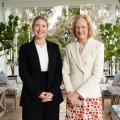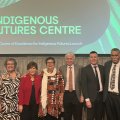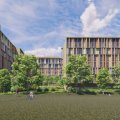The University of Queensland professor who recently chaired the body appointed to formulate rules and regulations for a contestable electricity market will outline Regulatory Activities in the Electrical Supply Industry in an address today (February 1).
Professor Don Anderson, of the University's Commerce Department, chaired the Electricity Reform Unit which drew up rules for the contestable Queensland electricity market on behalf of the State Government.
His address on Monday will be the first of a series of five lectures open to the public which will be conducted early in February as part of the 1999 Electricity Supply Association of Australia Residential School in Electrical Power Engineering. The school will be held at the University of Queensland's St Lucia campus.
"The series will provide something of interest to everyone, from big business to environmentalists to schoolchildren," the chairman of the residential school steering committee, Associate Professor Gerry Shannon of the University's Computer Science & Electrical Engineering Department, said.
"Each of the lectures will be informative in its own right and there are likely to be some interesting connections to be made between subjects such as a contestable electricity market, the requirement for countries including Australia to reduce greenhouse gas emissions, and the influence of gas pipelines on energy distribution."
All the lectures will begin at 7pm in the Raybould Theatre, Hawken Building, St Lucia campus. There will be an opportunity to ask questions after each lecture.
Topics and speakers are:
Monday, February 1: Regulatory activities in electricity supply. Professor Anderson. Large consumers of electricity will be able to buy their power from competing suppliers in the near future (residential customers will follow in 2001). Professor Anderson's lecture will provide essential information.
Tuesday, February 2: Global warming and greenhouse gas emissions - engineering solutions post-Kyoto. Professor Paul Greenfield, Deputy Vice-Chancellor (Research). Australia is vulnerable on a number of fronts in the wake of international agreement to reduce greenhouse gas emissions. Specific price or regulatory incentives will be needed to produce a positive outcome.
Monday, February 8: Gas pipelines and their influence on energy distribution in Australia. Bob Waldie, Queensland Treasury. Mr Waldie will discuss the implications for Queensland of current and prospective developments in gas pipeline construction and the flow-on effects to big industries such as metals processing and fertiliser production.
Tuesday, February 9: Personal protection against lightning. Emeritus Professor Mat Darveniza, Computer Science & Electrical Engineering Department. A device that provides protection against lightning strike for individuals or small groups has been developed - but who wants to be the brave person who stands inside while it's tested? If someone can be found, the odds will be on their side: only about 30 percent of people hit by a direct lightning strike are killed.
Wednesday, February 10: Electromagnetic fields and their effect on living tissue. Dr Andrew Wood, Swinburne University of Technology, Melbourne. Can high-voltage power lines cause cancer and do mobile phones put users at risk of developing disease? Dr Wood analyses the evidence and looks at the concepts of "prudence" and "prudent avoidance".
For further information, contact Dr Gerry Shannon telephone 07 3365 3612 or 041 1404 571
NOTE TO EDITORS: Dr Shannon has copies of Professor Anderson's overheads; Professor Greenfield's lecture text and overheads; and Professor Darveniza and Dr Wood's lecture texts. These are available under embargo.




